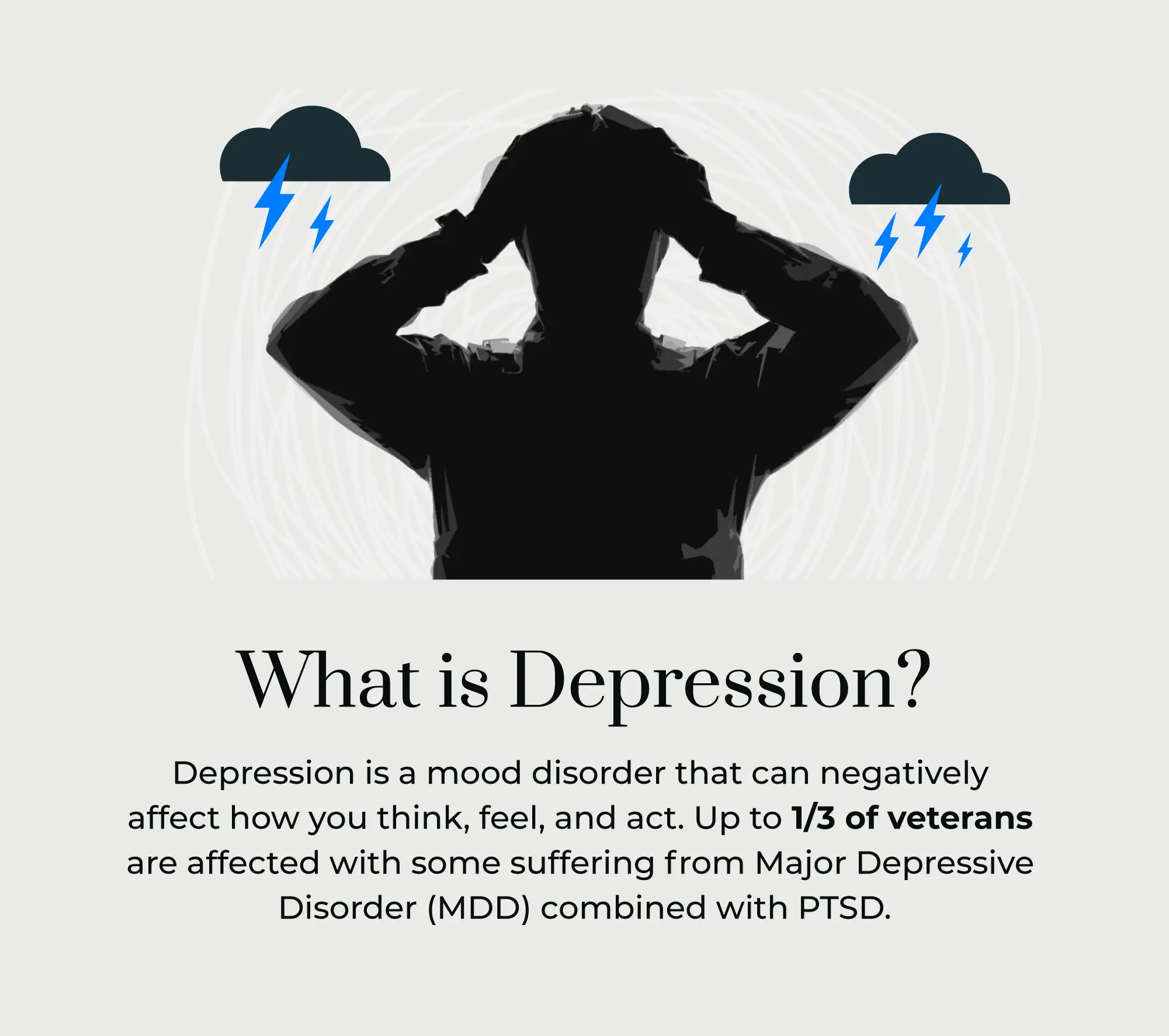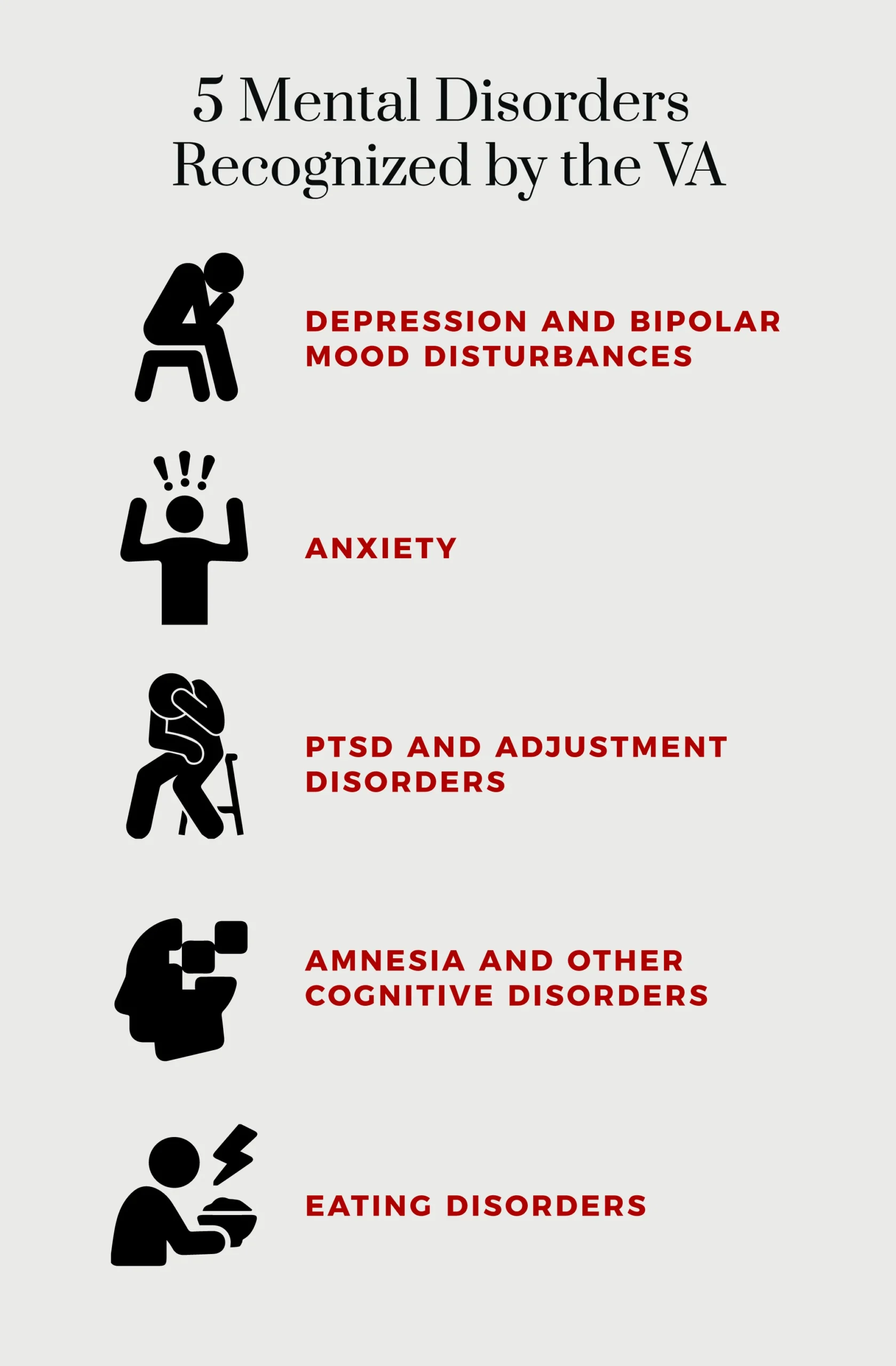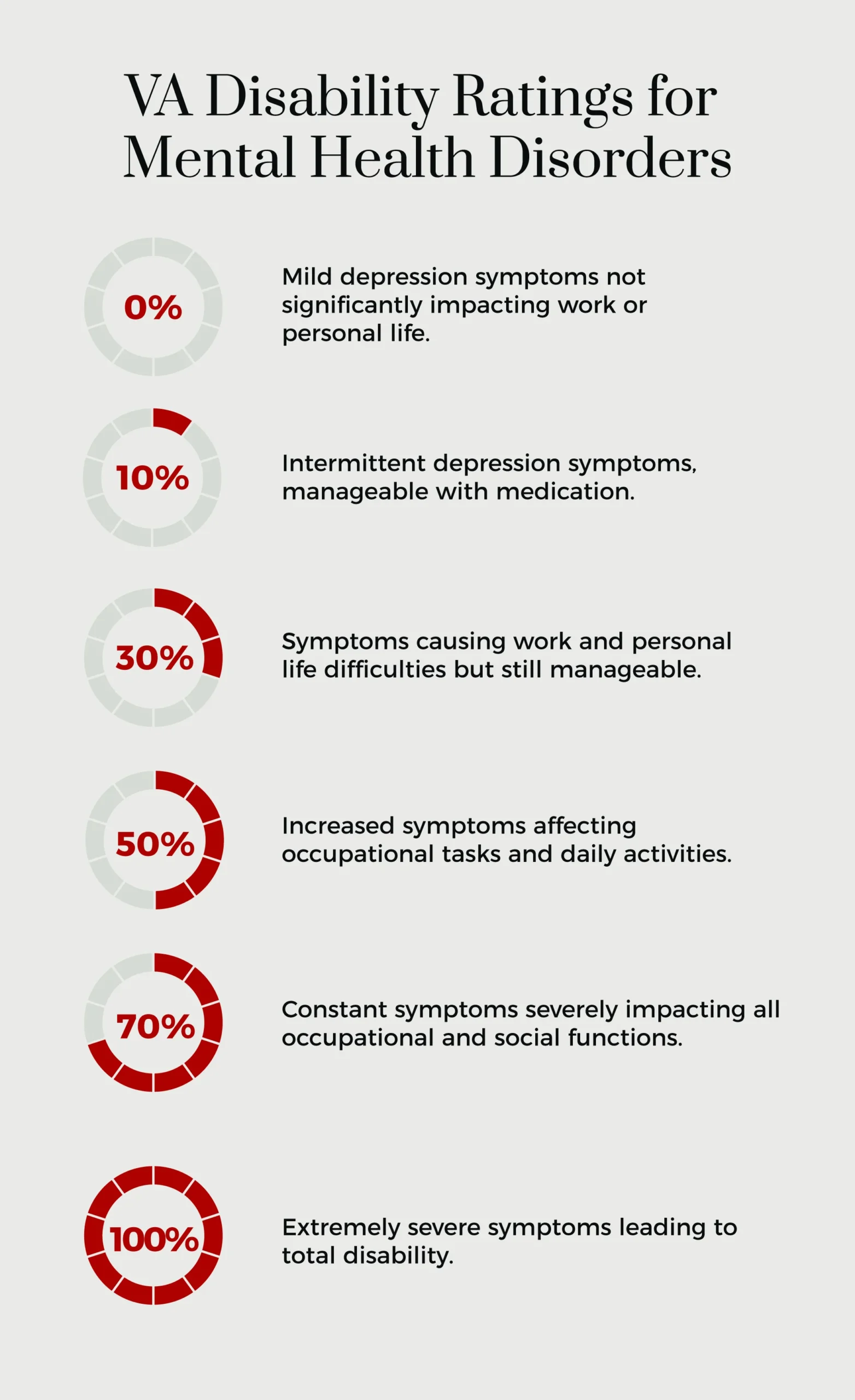Times of sadness are unavoidable in life. But when your sadness seems to become inescapable and affects your ability to lead a normal, productive life, or if feelings of sadness intertwine with other emotions like anxiety, then you are at risk of suffering from depression.
If you have been diagnosed with depression by a medical professional, and you believe that it may have its origins during your time in military service, then call us at (480) 498-8998 to schedule a free consultation with a veterans disability lawyer. We can help you understand your condition, guide you to treatment resources that are available to you, and help you get started with your initial disability claim, supplemental claim, or claim denial appeal.

Medically speaking, depression is a mood disorder. It manifests through persistent feelings of sadness, loss of interest in performing ordinary, day-to-day activities, or both.
Depression is a common condition among military service veterans. Depending on the seriousness of the symptoms, up to one-third of veterans are suffering from some degree of depression, up to and including persistent depressive disorder, manic depression, psychotic depression, and major depressive disorder (MDD).
What makes depression an even more serious problem for veterans is that many do not receive any treatment for it. Untreated depression can lead to secondary issues including attempting to self-medicate through substance abuse, which in turn can be a contributor to Post-Traumatic Stress Disorder (PTSD).
Fortunately, the U.S. Department of Veterans Affairs (the VA) recognizes depression as a medical condition for veterans’ disability benefits purposes.
Here, we will cover the basics of how the VA handles veteran disability claims, and how having an experienced veterans’ disability law firm like Stone Rose Law can help with initial benefit claims, supplemental claims, and, if need be, appeals of denied claims.
The VA recognizes the following kinds of mental disorders as disabilities:

If you qualify for depression-related disability benefits, then depending on the severity of your symptoms you could receive a VA disability rating from 0 to 100 percent.
The specific ratings for depression are 0 percent, 10 percent, 30 percent, 50 percent, 70 percent, and 100 percent.
The VA will determine your rating based on its evaluation of how your depression symptoms affect your ability to work, socialize, and engage in normal daily activities.
Each increase in your depression-related disability rating has associated symptoms that the VA looks for.
Here are some of the factors the VA takes into account when deciding your rating.
At this lowest rating, your depression manifests through mild or transient symptoms that do not significantly affect your work or your personal life and you can manage them without needing medication on a steady basis. A rating of 0 percent does not qualify you for monthly disability benefits payments; however, it does make you eligible for VA health benefits, including mental health counseling.
At this level, your depression symptoms are either intermittent, or if they happen regularly, you can manage them through the use of medications.
This rating is one of the most commonly assigned for depression, so it can be considered an average VA rating for this condition.
At this level, your depression symptoms reach a point where they can lead to difficulties in your work and your personal life, although you can still manage your normal daily activities.
Along with the 30 percent rating, this is the other most commonly assigned or average VA disability rating for depression.
Here your depression symptoms increase to the point where you can be diagnosed with significant impairment disorders like chronic sleep impairment, cognitive impairment, speech difficulties, impaired judgment, trouble understanding complex instructions or directions, mood disturbances, and even panic attacks that not only affect your ability to perform occupational tasks and your social life but also your day-to-day activities.
This level represents an increase in the severity of the symptoms that manifest at the lower ratings. When you reach this rating, your major depression symptoms can be constant and interfere with all the occupational and social functioning areas of your life. These symptoms can include angry emotional outbursts, lack of attention to personal hygiene, obsessive behaviors, trouble coping with significant stress, and thoughts of suicide.
At this level, the occupational and social impairment that prevents you from obtaining or keeping substantially gainful employment could qualify you for a boost to a total disability rating through Total Disability due to Individual Unemployability (TDIU). We will cover TDIU eligibility more below.
At this level, your depression symptoms are so severe that you cannot function and are effectively totally disabled. Symptoms often associated with this VA rating include major cognitive and emotional disorders, delusional behaviors including hallucinations, becoming confused about where you are or what time it is, amnesia, suicidal ideation, suicide attempts, and even posing a danger to others around you.
If you know your disability rating for depression, and you want to get an estimate for how much you might receive in monthly disability compensation for it and any other disabilities you are diagnosed within a combined rating, then see our VA Disability Calculator.

To claim disability benefits for depression, you will need to meet the basic requirements to establish the medically diagnosed existence of a current mental health condition and its connection to your time in service. This service connection is usually evidenced by a nexus letter that your doctor or treating mental health professional will provide.
Keep in mind that, unlike some other service-connected mental health disorders like PTSD, for depression, you do not need to identify a specific stressor event that happened during your time in service, only that the disorder began during that time. For example, many times servicemembers develop symptoms of depression or anxiety because of the stress that military life puts on their domestic situations; this is a valid connection to your military service.
The form you use to make a claim for depression-related disability benefits is VA Form 21-526EZ, “Application for Disability Compensation and Related Compensation Benefits.”
You can, and, if possible, should include supporting written statements like “buddy letters” with your VA claim filing. These statements can be made on VA Form 21-4138 and can be from people who know what you are experiencing, including family relations, friends, and coworkers. Supporting statements will not affect the VA’s decision on whether you have a disability, but they can influence how the VA assigns the severity of your disability rating.
Sometimes depression symptoms can arise because of the effects of another diagnosed service-connected disability. This is known as a secondary service connection.
An example of a secondary service connection is if you are disabled because of an injury while in service, then while in treatment for that injury, its symptoms—like chronic pain or side effects of medical treatment—lead you to a depressed mental state.
As a general rule, you cannot claim multiple mental illness disorders like PTSD, anxiety, and depression as separate disabilities. This is known as “pyramiding,” and the VA prohibits it.
What often happens instead is that if you have depression in addition to another mental health disorder, then the VA will take the depression symptoms into account when establishing a single disability rating for that disorder. This is frequently what happens with PTSD-based disability claims because depression is an underlying symptom of PTSD.
As we mentioned above when we discussed the 70 percent VA disability rating, in some cases depression can be the basis for a TDIU claim for 100 percent disability.
There are two ways to qualify for TDIU:
If you already have a recognized VA disability claim for depression, and your symptoms grow worse, then you can file a supplemental disability compensation claim with the VA to raise your disability rating to a level matching your disability.
You can make a supplemental disability claim with the VA in one of two ways:
In either case, you will need to support your claim for increased benefits with medical and other evidence that proves to the VA that your symptoms have worsened and that this has had an effect on your ability to work.
The VA rejects about one-third of all initial disability benefits claims it receives. If this happens to you, then you can appeal the VA decision within one year after its issuance.
Your appeal path can be a request for higher-level review, a supplemental claim to provide additional supporting evidence, or a formal board review.
An experienced VA disability benefits appeals attorney, like one of our VA lawyers at Stone Rose Law, can help you understand the reason why the VA denied your initial claim and help you decide on the best option for your unique situation.
At Stone Rose Law, we are first and foremost VA disability advocates for veterans suffering disability claims and we serve on behalf of veterans nationwide. Our VA-accredited attorneys give you affordable, high-quality veterans appeals legal assistance.
Our veterans lawyers provide highly professional legal representation to military veterans, helping them through the VA process to receive all the veterans’ disability benefits they are entitled to.
A Stone Rose Law VA disability lawyer can help you prepare your disability claim for depression, anxiety, PTSD, or other mental health disorders. We also monitor your claim status and consult with you before disability examinations—all at no cost to you.
If the VA denies your original disability claim for depression, then our VA benefits law firm will assign a VA disability appeals lawyer to help you pursue a VA appeal with the Board of Veterans Appeals while providing free representation on a contingency fee basis.
This means you won’t pay any fees unless we win your appeal.
For more information about how one of our lawyers can help you with your VA disability compensation claim or appeal, request a free assistance consultation at (480) 498-8998. Or, if you prefer, you can reach us online to ask a question about veterans law, VA disability benefits, or to set an appointment with one of our veterans lawyers for a free case evaluation.